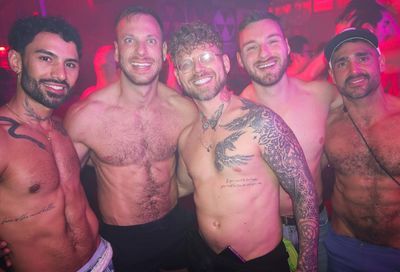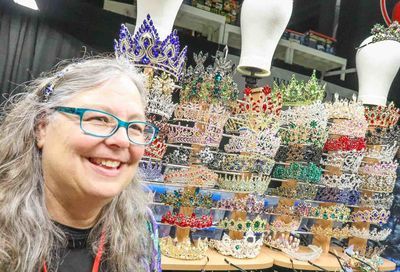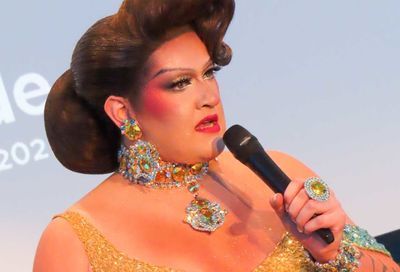Activists Voice Crime Concerns
Town-hall event draws key players, but little grassroots interest
Representatives from the District’s various public safety agencies and the Mayor’s Office of GLBT Affairs held an outreach meeting on Wednesday, Sept. 28, aimed at members of the LGBT community but received an arguably underwhelming response.
The town-hall meeting, held at the Reeves Center Municipal Building at 14th and U Streets NW, was moderated by longtime activist Peter Rosenstein, who sat with a panel of representatives from the Metropolitan Police Department’s Gay and Lesbian Liaison Unit (GLLU), the D.C. Fire Department, the Office of Victims Services and Deputy Mayor for Public Safety Paul Quander to answer audience members’ questions about public safety officers’ relationship with the local LGBT community.
About a dozen GLLU affiliate officers sat near the back of the room. Taken together, representatives from the District agencies outnumbered community members.
The meeting followed a summer spike in crime resulting from a string of shootings, assaults and robberies directed against members of the LGBT community, starting with the July 20 shooting of transgender woman Lashai Mclean in Northeast D.C. The day after the meeting, a man reported being robbed at gunpoint and called ”faggot” near Mount Vernon Square.
After allowing each agency representative to make brief statements regarding LGBT-friendly policies, Rosenstein invited questions from the small audience.
”We get lots of very mechanical answers and nobody can tell you anything,” transgender activist Jeri Hughes said of the agencies’ response to inquiries from the community.
Throughout the meeting, activists primarily targeted their questions toward police officials, including Capt. Edward Delgado, director of the MPD’s Special Liaison Division, and Sergeant Carlos Mejia, who heads both the GLLU and the Latino Liaison Unit.
Questions included concerns about MPD’s treatment of LGBT crime victims, especially transgender individuals; a perceived lack of cultural sensitivity by officers dealing with LGBT complainants; and the quality of sensitivity training provided to MPD officers.
Nearly everyone in the audience commended the work done by GLLU officers, but said insensitive actions, ignorance or hostile attitudes of other officers who have not undergone sensitivity training can undermine any well-meaning departmental policy.
”We know that the brass gets it, but that’s not going to easily translate onto the street,” said Richard Rosendall, the vice president for political affairs for the Gay and Lesbian Activists Alliance (GLAA).
Delgado said MPD undertakes internal disciplinary actions when an officer acts inappropriately, and that officers are regularly reminded of what actions are unacceptable. He also defended the department’s LGBT sensitivity training and the chief’s 2007 decision to reduce the number of full-time GLLU officers in favor of having GLLU-affiliate officers in each of the city’s seven police districts.
But Jason Terry, an activist with the DC Trans Coalition who has worked with MPD to provide LGBT sensitivity training, said that training was hamstrung by a lack of financial resources, infrequently scheduled training sessions and the lack of a set curriculum for the training.
”On the current schedule, it would take 32 years to train the full force of 4,000,” Terry said. ”The question is: When will we get the money, resources or more time for training?”
Rosenstein and Jeffrey Richardson, director of the Mayor’s Office of GLBT Affairs, closed the meeting by saying it was a ”great start” and promising to hold similar meetings in the future.
Afterward, attendees said they were hopeful or trying to be optimistic, but were also uneasy because many of the issues raised at the meeting were recurrent themes without obvious signs of progress.
”After five years, I would probably have to say we are much worse off than we were before,” said transgender activist Ruby Corado. ”And here we are today, still talking about the same issues as five years ago.”
Others blamed the standstill on the lack of community engagement rather than police inaction.
”This meeting should have been standing-room only,” said June Crenshaw, co-chair of the Rainbow Response Coalition. ”Instead, we were outnumbered 3–to-1.”
Support Metro Weekly’s Journalism
These are challenging times for news organizations. And yet it’s crucial we stay active and provide vital resources and information to both our local readers and the world. So won’t you please take a moment and consider supporting Metro Weekly with a membership? For as little as $5 a month, you can help ensure Metro Weekly magazine and MetroWeekly.com remain free, viable resources as we provide the best, most diverse, culturally-resonant LGBTQ coverage in both the D.C. region and around the world. Memberships come with exclusive perks and discounts, your own personal digital delivery of each week’s magazine (and an archive), access to our Member's Lounge when it launches this fall, and exclusive members-only items like Metro Weekly Membership Mugs and Tote Bags! Check out all our membership levels here and please join us today!





















